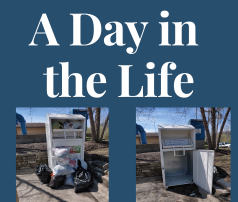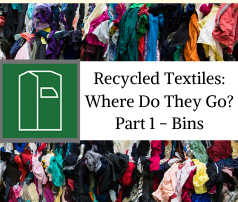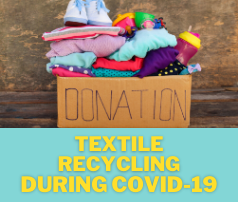 Resale Stores
Resale Stores
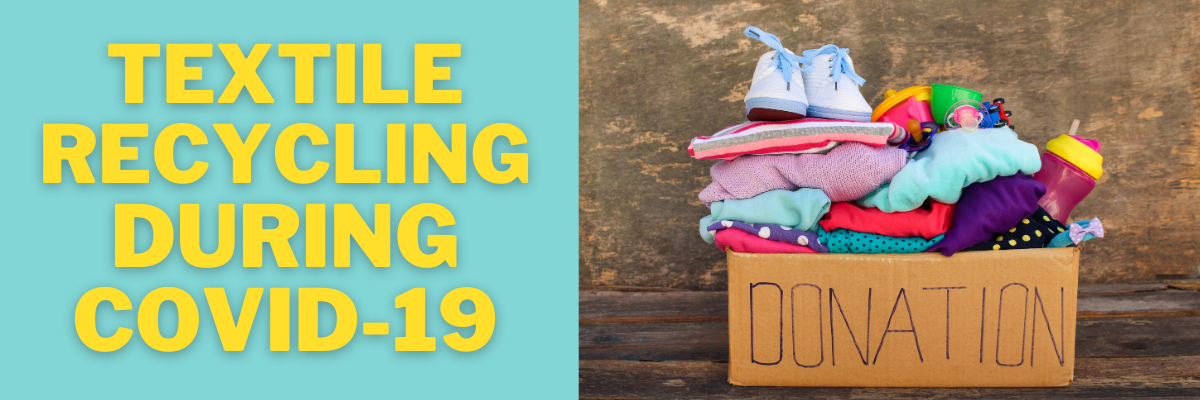
As resale stores and our own textile recycling bins reopen around the Chicagoland area, you might be wondering:
“Is this safe?”
“Can and should I donate?”
“What new protocols are in place to keep employees, donation providers and customers safe from catching coronavirus?”
In this blog, we hope to educate our recyclers about what has changed in textile recycling during Covid-19 and how to stay healthy during our ongoing pursuit of keeping textiles out of landfills and taking care of our Earth.
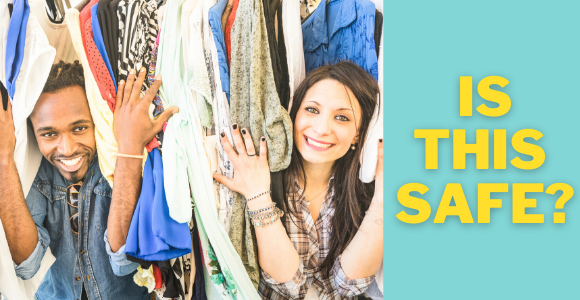
Is This Safe?
The biggest question about recycling textiles and buying secondhand during the coronavirus pandemic is “Is this safe?”
Recently, the Secondary Materials and Recycled Textiles association (S.M.A.R.T.) posted about this very question. They wrote,
“Worried about visiting your local donation center, charity, or thrift store? Have no fear! As they reopen, we have heard from many entities that they are taking social distancing restrictions and enhanced sanitation policies seriously. This means you can donate in confidence, while knowing that you are making a significant difference for our environment.”
As a personal consumer of secondhand items, I have already witnessed this statement at work shopping at my local thrift store as well as attending a children’s consignment sale.
At the thrift store, aisles had been spread wider to encourage social distancing, markers were placed on the floor at the check-out lines, sanitizer was right inside the door and all employees and shoppers were wearing masks as required.
At the consignment sale, there were two employees behind plastic windows with masks on, hand sanitizer and masks upon entry as well as a thermometer checking customers’ temperatures. While shopping, there was only one other shopper who entered the entire hour I was there. And of course when I returned home, all items immediately went into the laundry or were sprayed down to disinfect.
In addition to reassuring those who shop and donate at secondhand stores in their blog post, S.M.A.R.T. issued a statement months prior addressing the Used Clothing Ban that many countries have adopted during Covid-19. In it, they assure importers the safety of continuing to buy and receive secondhand items, which also can reassure patrons of thrift stores. They stated,
“Numerous studies including those published in the New England Journal of Medicine and The Lancet have shown that COVID-19 may be detectable on hard, non-porous surfaces like plastics and metals for hours and potentially up to 2 to 3 days. The virus, however, is far less likely to survive on soft, porous surfaces like textiles including rugs, carpets and clothing, new or used. As recently issued guidance from the U.S. Centers for Disease Control and Prevention (CDC) on COVID-19 notes, mitigating whatever small risk might be present on soft, porous surfaces like textiles is easily addressed by laundering the textile/garment according to manufacturer instructions in warm water. This advice is supported by the fact that countless hospitals and other medical facilities are utilizing reusable linens and personal protective equipment/hospital apparel to protect healthcare workers that are treating patients infected with COVID-19. Notably, the CDC has not made any changes to existing guidance on how these textiles should be handled and processed since the outbreak of COVID-19 in the United States.” (read more here)
Another member of S.M.A.R.T., Bank and Vogue, agrees,
“From way before the COVID-19 outbreak, thrift stores have taken measures to keep a clean and healthy environment in their facilities. During this pandemic, these procedures have just heightened. As thrift stores begin to open up around the world, they have implemented new protocols to ensure the virus is not transmitted to any of their stakeholders. For instance, the clothes collected from bins usually stay 72 hours in trailers before getting into the warehouse. Also, thrift stores disinfect the workplace several times a day, all the employees use protective masks and gloves, and they assure social distancing by establishing a maximum capacity inside their facilities.”
It is ultimately up to you and how comfortable you feel leaving home right now, and what protective measures you are currently following when being around others. However, rest assured that donation centers and thrift stores are taking every measure on their end to ensure that coronavirus is not spreading at their facilities and that they are striving to keep employees safe and healthy.
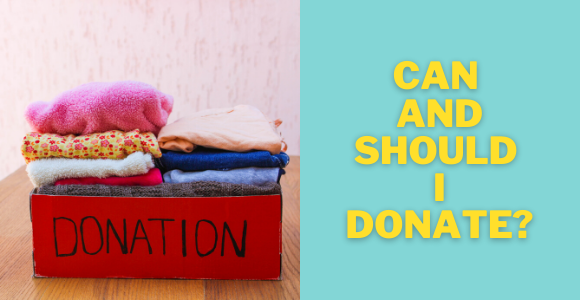
Can and Should I Donate?
Can I?
The simple answer to the second question is a resounding yes. Thrift stores are reopening. Our textile recycling bins are slowly opening back up also, with the bin located by our warehouse already available 24/7. Donation centers are open again with stacks upon stacks of boxes and bags and furniture donations. What has everyone done at home during the quarantine? Clean out their closets…and homes apparently. Thrift stores and donation centers are currently overwhelmed by donations. A friend online recently posted a picture of our local Goodwill store with donations stacked from the donation door all the way to the front door. It has become a problem across the country. Are your donations still desired by secondhand stores? Yes. But maybe not right now.
The overwhelming donations have become such an issue that the media has begun reporting about it. In a recent piece by Adam Minter, author of “Secondhand: Travels in the New Global Garage Sale”, he stated,
“A drop-off in demand plus a surge in supply is creating a storage problem, with thrift stores across the country now looking for additional space or even suspending donations. That, in turn, has led to a rush of well-intentioned spring cleaners dumping their used goods at the doors of closed thrift shops. These informal “donations” don’t help anyone: They create health and safety risks, force thrifts to pay disposal costs for stuff that might otherwise have been a source of revenue, and increase the likelihood that perfectly good products will end up in landfills.”
Keeping this in mind, Minter and executives of charity shops he spoke with encourage those who want to donate to simply hold onto their donations for a while longer until donations start to slow down. In addition, Minter shared advice to those desiring to donate:
“If you’re looking to donate, you should also make sure your stuff is labeled and take care that it’s actually usable. A broken toaster isn’t a gift to Goodwill, it’s a cost. Most thrifts maintain lists of acceptable items that are worth consulting before dropping anything off. Whatever you do, don’t ‘donate’ when the thrift store is closed. More likely than not, your stuff will be pilfered or ruined by the elements before it gets through the door.”
During the first few months of coronavirus, we were stuck at home with nowhere to go surrounded by all of our stuff, so we cleaned. Chicago Textile Recycling made posts about now being the time to clean out those closets and dressers and more. As we cleaned out our homes, we had no choice but to store it somewhere until donation centers and recycling bins reopened. Here is the advice that Minter, thrift and charity shop owners, and CTR wants to pass along…keep it there, for now. Simply wait a little while longer to donate so that these stores and charities are not overwhelmed or burdened by your donations, but waiting eagerly for them again.
Should I?
As stated in the first quote above by the S.M.A.R.T. association, “you can donate in confidence, while knowing that you are making a significant difference for our environment”. Should you continue to donate old textiles instead of throwing them in the trash? Absolutely. In the same post, S.M.A.R.T. says,
“If you have taken the time to go through your old clothes, shoes and other unused or unwanted textiles while navigating quarantine, we hope you opted not to toss them in the trash. Why? Because when they find their way to landfills, they have many negative environmental impacts, including contributing to greenhouse gas emissions!”
Can you donate? Yes. Should you donate? Yes. But hold on to your donations just a few months more. Thrift stores and charity shops want your donations. The health of our planet needs your donations to stay out of landfills. This involves not throwing your old textiles away AND waiting until those businesses are ready and able to handle your donations in a way that benefits our planet and continues to help them in their missions to help others through your donations:
“The thrift industry is more important than most Americans realize. Largely out of sight, it employs tens of thousands of people and generates at least $18 billion in annual revenue. It keeps an enormous amount of used stuff out of landfills, and contributes billions each year to social-service and job-training programs that are crucial to communities nationwide.”
Minter continues later in the article, describing consequences of overwhelming resale stores right now,
“The consequences should be a concern for all Americans, whether or not they shop in thrift stores. In 2018, Goodwill alone funded $5.3 billion in charitable services, including education assistance, job training and work placements. Smaller donation-based charities, such as the arc Thrift Stores in Colorado, spend millions each year employing people with disabilities. As the pandemic’s economic impact spreads, those contributions will necessarily shrink. Already, Goodwill is facing thousands of layoffs nationwide.”
Let’s take care of our planet and the people on our planet by waiting a little while longer.

What new protocols are in place to keep employees, donation providers and customers safe from catching coronavirus?
As stated above under “Is it safe?,” many thrift stores and charity shops have adopted new or increased existing disinfection protocols in their stores. In addition, they have implemented creative solutions to ensure social distancing and other ways to decrease the chances of spreading coronavirus in store. Some of these new protocols include:
- clothes collected from bins usually stay 72 hours in trailers before getting into the warehouse
- thrift stores disinfect the workplace several times a day
- all the employees use protective masks and gloves
- they assure social distancing by establishing a maximum capacity inside their facilities
- aisles spread wider to encourage social distancing
- markers placed on the floor at check-out lines to maintain six foot rule
- sanitizer placed inside front door
- shoppers requirement to wear masks being enforced
- reduced hours to have more time for cleaning and disinfecting
With these protocols set in place, you can rest easy returning to your local resale stores.
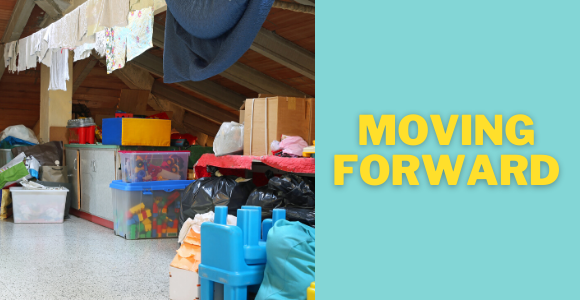
Moving Forward
As we are all learning new ways of doing things during this time of coronavirus, it is still so important to continue to prioritize the health of our planet. Recycling textiles is one big way we can do this. Now that businesses and bins are reopening, remember to save your textile donations and gradually bring them in when your local resale stores are no longer overwhelmed. Remember also to prioritize the health of yourself and others by wearing a mask and social distancing.
